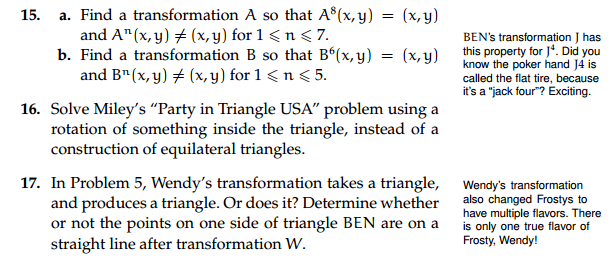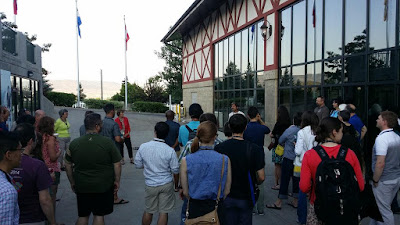In any case, there are programs for teachers, undergraduate college faculty, undergraduate students, graduate students, and mathematics researchers. I, of course, am in the Teacher Leadership Program. Our normal day starts with breakfast with other math teachers and researchers. It's nice to be able to both reflect and discuss with other teachers from around the country, and meet some pretty high-caliber mathematics researchers.
The bulk of the mornings are filled with two sessions. The first is Developing Mathematics where we work in groups of six to complete a problem set. The problems are written by Darryl Yong and Bowen Kerins, and are some of the most amazing problems I have ever attempted. First, they are flawlessly scaffolded. Each day's problems is divided into "Important Stuff", "Neat Stuff", and "Tough Stuff". The important stuff are concepts that are integral to problem sets in later days, and are carefully chosen as to subtly hint at a major idea or astounding connection and let you draw your own conclusions. The problems flow gracefully from one onto the next and build on each other. If you don't have time to get to the neat or tough stuff, don't worry; they will appear in a different incarnation on a later day. Note: that is neither Darryl nor Bowen below.
Darryl and Bowen are also hilarious. They offer prizes for coming to class on time (Fig Newtons and Leibniz Biscuits) and put references, jokes, and puns into the side and foot notes. Here is a sample:
We also have Reflection on Practice where we observe classes, read student work, and discuss pedagogy. It's interesting to see different teacher's perspectives from different parts of the country. After RoP, its lunch with all the other programs.
In the afternoons, we create professional development and resources for teachers. I am part of a group that is writing a four part online webinar to help geometry teachers understand the transition to a transformation based perspective of congruence and similarity under Common Core. I'm working with James King and Gabe Rosenberg, but more on that later.
There are a number of afternoon and night activities including graduate math lectures, technology demonstrations, special interest groups on standards based grading, meeting important people, polyhedron origami sessions, hikes (local and far away), volleyball games while discussing growth mindset, and of course, talking math education by the pool.








No comments:
Post a Comment